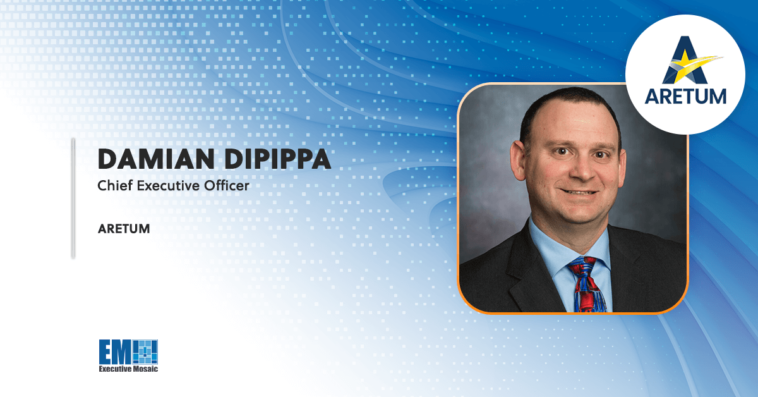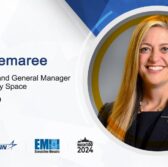Damian DiPippa is a known quantity in the aerospace, military and information technology systems worlds, with broad expertise in satellite operations, ballistic missile defense, avionics and more. He gained experience at companies like Northrop Grumman/TASC, ManTech and Engility.
You call DiPippa if you want to establish and grow a new entity. He was instrumental in transitioning Perspecta to new ownership under Peraton and was the founding CEO of Arcfield, the systems engineering spinoff of Peraton. Now, for the last year, he has stewarded the freshly established ARETUM, the result of a series of mergers and acquisitions deals.
DiPippa spoke with ExecutiveBiz about the combinations that resulted in ARETUM, the values the company is built on and where it’s going from here.
1. What can you tell me about your company’s recent M&A efforts?
ARETUM (simply pronounced “R-TUM”) was founded in 2023 through the private equity-backed acquisition of four smaller businesses to create a new mid-sized platform competitive within the GovCon services markets. Renovous Capital Partners acts as the managing partner for multiple investors. This began with the initial acquisition of the Panum Group years earlier, primarily rooted in the federal and civilian government spaces along with its Department of Defense-focused subsidiary Marton Technologies.
An early 2023 merger with Miracle Systems provided the scale to solidly compete within the mid-tier market as the newly founded ARETUM, with capabilities in cyber defense, cloud migration, IT services and program support. At this point, I was approached to lead the integration of this merger as CEO and develop the future growth and value creation plan for the newly founded company. This immediately led to the acquisition of our fourth company, Artemis Consulting, which provides market-leading agile development, analytics and digital transformation primarily within the legislative branch of government.
We recently kicked off the 2024 operating year as ‘one ARETUM’ having aggressively pushed through 2023 to reorganize, integrate, scale and harmonize all of our corporate operations. We have effectively positioned ourselves to collaboratively provide and expand our legacy capabilities across all of our existing customer markets and move with agility to new adjacent markets. We will also continue to look for additional acquisition opportunities that drive us up the technology stack and move us into new markets where customers will benefit from the depth and breadth of our core capabilities.
2. How do you set your priorities in an ever-changing market? What are the key factors you look for when making bidding and/or acquisition decisions?
We establish our priorities upon a foundation of five key objectives and principles:
1. Be respected and valued by customers, partners, employees and investors as an honest and ethical company that is focused on growth through mission success and measurable outcomes.
2. Expansion and diversification into new markets so that we are not ‘putting all of our eggs into one basket.’
3. ‘Winning big league games’ by focusing on larger full-and-open opportunities than what may have been traditionally competed for in the past.
4. Offering a core set of discriminating capabilities that provide value-added solutions to customers across multiple markets.
5. Managing and operating as a premier mid-sized company utilizing tools and automation to do the ‘routine things routinely,’ allowing us to focus on our customers’ missions, improving our core capabilities and taking care of our employees.
As the market continues to shift and change, we base our bidding and acquisition decisions on this foundation to avoid spreading ourselves too thin, to avoid diluting our core offerings and to stay focused on our overall value creation plan.
3. How has GovCon changed since you began your career, and what’s your take on the market now?
I began my career as an aerospace engineer working on highly technological systems and problems for what was then known as the Reagan Star Wars Era. Prior to the advent of the internet, GovCon companies somewhat cornered the market in providing technical talent and technology advancements in support of national security missions. The need to support these national security missions often drove the corporate technology advancement and associated investments resulting in numerous mission specific “one off” developments specifically built for independent government agencies.
Today, the technological advancements in the commercial marketplace are dramatically outpacing government requirements and acquisition cycles. Instead of driving the technology advancements, more and more, national security missions are looking at how they can apply the technology advancements and talents initially developed within the commercial marketplace. They no longer wish to have mission-specific solutions developed and want to leverage the advancements and investments made within the commercial markets — cloud, cyber, data analytics and AI are just a few examples of these cross-market technologies.
This requires companies like ours to partner with commercial companies as integrators of those advanced companies. It also challenges us to now compete for talented employees with skills that are much more transferable between the commercial and GovCon markets. Both of these were lesser concerns of GovCon companies 20 and 30 years ago.
5. Where are you seeing opportunities for expansion in ARETUM’s portfolio? What new capabilities or markets are you eyeing?
ARETUM has a wealth of addressable market opportunities where our past performance and core capabilities provide customers with technology enabled mission support from a new provider founded on well-established platforms while retaining the agility to rapidly move within a very dynamic technology climate amongst equally evolving mission needs and priorities. We will continue to move up the technology stack in developing and integrating solutions for our existing customers in the legislative branch of government, Department of Homeland Security and other federal agencies.
We also see a number of expansion opportunities for us within the defense and intelligence communities and other national security agencies who would equally benefit from our expertise in cybersecurity, cloud migration, digital transformation and data analytics. Our challenge will be to focus and prioritize our efforts in those markets and capabilities where we will provide the most value, and refrain from spreading ourselves out too thin across a very large addressable market.





